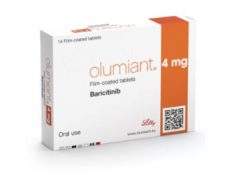 In an interesting development, Natco has approached the Controller of Patents for a Compulsory Licence under Section 92 of the Patents Act, for the drug Baricitinib. The 12 page application is available here. Baricitinib is generally used to treat diseases like rheumatoid arthritis and has been “reportedly approved” (as per the application) for such use in EU and India in 2017 and 2018 respectively. The application goes on to quote studies that indicate the Baricitinib in combination with Remdesivir is more effective for patients with Covid 19, as compared to Remdesivir alone, with possibly less side effects as well (see Para 20-23). The application then points to the US FDA’a recent grant of Emergency Use Authorization for Baricitinib in combination with Remdesivir as of 19.11.2020, and that the dosage tends to be 1 tablet a day for up to 14 days.
In an interesting development, Natco has approached the Controller of Patents for a Compulsory Licence under Section 92 of the Patents Act, for the drug Baricitinib. The 12 page application is available here. Baricitinib is generally used to treat diseases like rheumatoid arthritis and has been “reportedly approved” (as per the application) for such use in EU and India in 2017 and 2018 respectively. The application goes on to quote studies that indicate the Baricitinib in combination with Remdesivir is more effective for patients with Covid 19, as compared to Remdesivir alone, with possibly less side effects as well (see Para 20-23). The application then points to the US FDA’a recent grant of Emergency Use Authorization for Baricitinib in combination with Remdesivir as of 19.11.2020, and that the dosage tends to be 1 tablet a day for up to 14 days.
Natco was responsible for the first and only successful Compulsory License applicant in India thus far, when they received one for Bayer’s Nexavar. The patent for Barcitinib is owned by Incyte Holdings Corporation, with a license to Eli Lilly, who markets it under name Olumiant. It is unclear whether Eli Lilly is the exclusive licensee or not.
This time however, Natco is not going the Section 84 route, but rather is taking the Section 92 route. This may be quite a strategic move, as rather than fighting it out with the patent owner/licensee, the S.92 route requires the Government to accept / reject the application based on the straightforward criteria of whether the patent in force is necessary in a circumstance of national emergency, extreme urgency or a case of public non-commercial use, including in public health crises such as epidemics. Needless to say, there is clearly an on-going emergency.
Natco relies on Form 27 data to show that Olumiant is not manufactured in India, that less than 9000 tablets were imported in 2019 and 2020, and that the average cost per tablet is approximately INR 3230. (A quick google search though, indicates that market prices may be cheaper than this – see here for instance, INR 21,000 for 28 tablets, which comes to about INR 750 per tablet) The current number of Covid-19 patients undergoing treatment, they point out, is around 34 lakhs and increasing, and that at best, Eli Lilly’s supply would meet the needs of only approximately 600 patients. And finally, they also point out that Baricitinib was mentioned by the Delhi High Court in the on-going Covid case, as one of the drugs which CLs should be discussed / considered for.
In terms of other formalities, Natco seems all set. They’ve stated that they’ve applied for and received emergency use authorisation from the DCGI on 29.04.2021, who has also recognised an unmet medical need. And that they’ve submitted bioequivalence studies that show bioequivalence to Olumiant. Natco also states that they’d applied for a voluntary license with the patent holder, but only received a response from its licensee, Eli Lilly, which supposedly asked for confidential information. For current purposes, Natco says they are willing to make the tablets available at prices between INR 15 per tablet, to INR 30 per tablet depending on the dosage, though they state that they will inform the Controller later as to the quantity that they can make available. This price also seems to include the 7% royalty on net profits that they’ve listed in their requested terms and conditions, and is significantly cheaper than both Natco’s stated figures of Eli Lilly’s product being INR 3000 per tablet, or the online link I mentioned above of INR 750 per tablet. Interestingly – these terms and conditions also state that preference is to be given to patients in economically weaker sections, government welfare schemes and in remoter areas of the country. Meanwhile, Natco has also filed an intervention application before the on-going Supreme Court suo moto writ petition.
As discussed on the blog in great detail, the Indian government has been asking for an IP Waiver at the WTO, with reports of a modified version of the waiver being placed for discussion soon. Both the Delhi High Court and the Supreme Court have pretty much told the Indian government that this is the time to consider compulsory licences. Prima facie – this seems like a solid case for a CL. Now it remains to be seen whether the executive will walk its talk.
(Important to keep in mind though – that while the waiver and CL may help in this case – the question of know-how, manufacturing capacity, trade secrets, etc still remain unanswered when it comes to vaccines. We’ll try to carry a more detailed post on those issues, soon).
